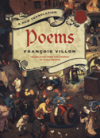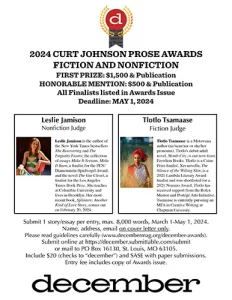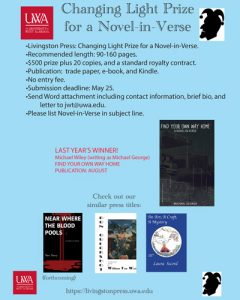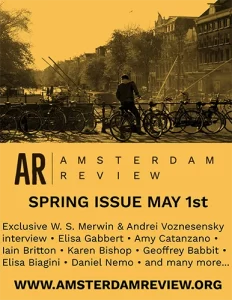Poems
I’ve found more often than not among poetry fans the myth of Villon the “criminal poet” usually exists far in advance of any experience reading the actual work. Much of this is a result of the general lackadaisical attention given in our day and age to searching out older texts on our own to enlarge our reading. We tend to hear from others more than discover for ourselves, taking what we hear as valid evidence rather than looking for ourselves. Books such as this one are needed opportunities to rectify this behavior.
I’ve found more often than not among poetry fans the myth of Villon the “criminal poet” usually exists far in advance of any experience reading the actual work. Much of this is a result of the general lackadaisical attention given in our day and age to searching out older texts on our own to enlarge our reading. We tend to hear from others more than discover for ourselves, taking what we hear as valid evidence rather than looking for ourselves. Books such as this one are needed opportunities to rectify this behavior.
Villon was “born around 1430” and any trace of him disappears from the historical record after 1463. He lived the majority of his life in Paris, trained at least in part as a religious cleric, and kept himself busy—always one step ahead of (and sometimes in back of) legal authorities of his day. From his poems, it appears he was a devotee of prostitutes and small-time criminals, a habitué purveyor of tavern life permeated by action going on roundabout “the streets” (to put it in the vernacular of today’s world). It’s a known fact that he—perhaps accidentally—killed a priest in a knife fight, managing to barely get off without being hanged. Instead, the decree banishing him from Paris for 10 years for the murder is the final document existent in regard to his life.
Translator David Georgi points out that it was Ezra Pound (following in the tracks of the French Symbolists) who is in large part responsible for an early heralding of Villon’s work into English. Georgi argues that for Pound “Villon represented an ideal of unsentimental verse built in concrete details […] everyday objects like buckets, turnips, and roasted chickens.” Rather infamously, Pound quipped that Villon “sings of things as they are.” Indeed Villon’s poems face reality head-on, as when he sings of the visible changes of an aging body in lines beginning “This is all that human beauty comes to?” Villon offers no encouraging words for aging well. This is no celebration of the body immaculate. Ever the realist, Villon lays everything bare, taking delight in accurately nailing a true-to-life description, which Geogi’s translation carries over well into English:
And the breasts? Shriveled and shrunken.
The hips? As bad as the tits, and
that sweet little thing—hah! The thighs
are thighs no more, but drumsticks,
brown and speckled like a sausage.
Georgi has included all of Villon’s work, which “consists of one longish poem of forty stanzas, a longer one of about two thousand lines, and sixteen shorter poems.” The two long sequences, what is usually known as The Testament, and the similar, yet shorter, Bequests, entail an accounting of what the speaker, identified as Villon, leaves behind upon his future death. Embedded within The Testament are a number of skillfully rendered ballads. Ballads, too, make up the majority of his shorter poems. All of the work is intrinsically tied to biographical facets of the character Villon’s life: his interests, background, social life, friends, as well as enemies.
The imagery in Villon’s poems is vital to the sense. The poet is always holding the reader close, but as if holding the poem itself even closer. This is as close to really meaning it as poetry ever gets:
And you, my teeth, bestir yourselves; each
leap forward and sing your gratitude
louder than an organ, trumpet, or bell
and, just for once, give no thought to chewing;
consider how close I’ve come to being dead.
The knowledge that these lines are from Villon’s final poem, and thus the only record of his response to the repeal of his death sentence in exchange for his ten years banishment, only intensifies and validates the feeling that Villon lived through his poems. They are an undeniably self-conscious projection of the poet’s life-as-myth—an enduring accomplishment.
Georgi’s translation is not only the most complete but easily among the best of Villon’s work I’ve yet to encounter. He doesn’t attempt to force any metrics or rhyme, focusing his efforts instead on keeping the English crisply alive, concise, and accurate in terms of sense. Georgi utilizes utterly accessible diction while retaining the original text on facing pages. It was also reassuring to find him remark:
At an early stage, I also had the privilege of a lively correspondence with Stephen Rodefer, discussing his 1977 translation, or transformation, Villon. As a poet rather than a translator per se, his business with Villon was different than mine, but his boldness and inventiveness were an important lesson for me.
Rodefer’s versions (he’s also more recently done some Baudelaire covers; see the Rodefer issue of the Chicago Review) are veritable poetic encryptions having more to do with his own life and reading than strictly focusing upon Villon’s own. They are nonetheless an invaluable source of insight. That Georgi is aware of Rodefer and searched him out in correspondence is to his credit. Rigorously following through on such details make his book one of the Villon translations which many readers, including myself, have long been looking for.





